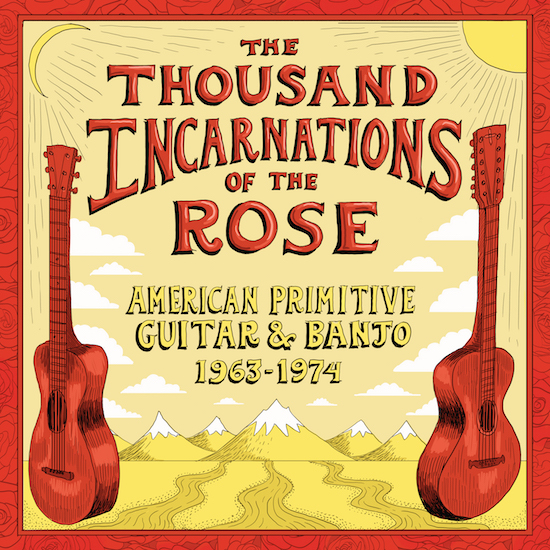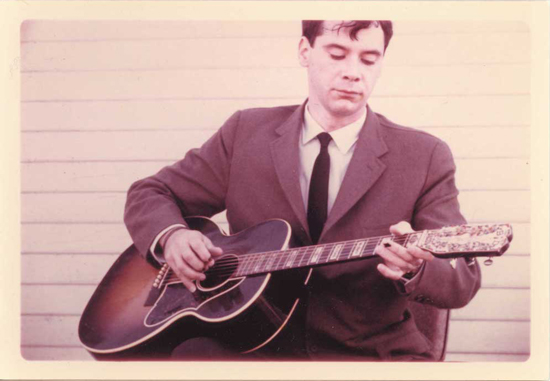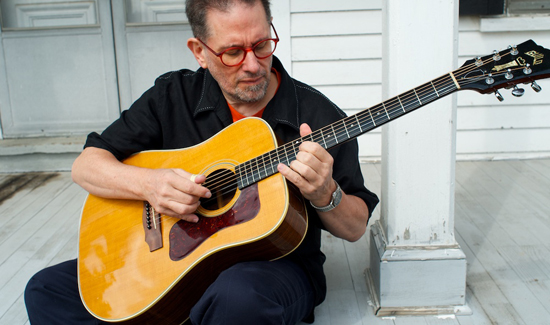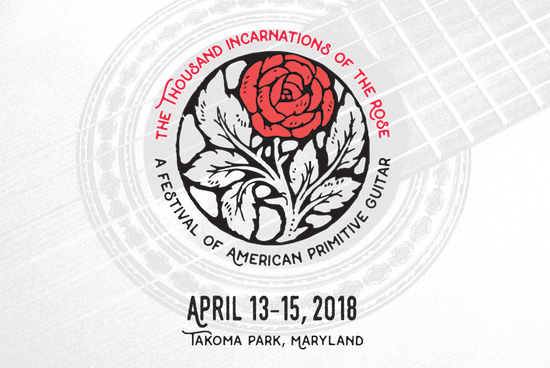
The Thousand Incarnations Of The Rose, a compilation and festival of American Primitive Guitar Music, blooms this spring
Sometime in 1958, a teenaged guitar player from Takoma Park, Md., named John Fahey started recording imitations and send-ups of the blues in the basement of Joe Bussard, a fellow 78-RPM record collector. The next year, he made his first LP, Blind Joe Death, which was issued on his own Takoma Records. Back then, people didn’t record solo instrumental guitar music, make their own records or start record companies to put them out; Fahey started his own scene from scratch. In the coming decade, Takoma became a magnet for other guitar and banjo players with a similar penchant for synthesizing folk, blues, Indian and other material into instrumental music that prioritized the expression and evocation of emotion.

Since the turn of the century, a legion of newer guitarists, from veterans with personal ties to the original Takoma recording artists to youngsters born in the 1990s, have kept the music alive and growing. And this spring, 59 years after Fahey sent Blind Joe Death to the pressing plant, both the past and present of American Primitive Guitar will get their due. On March 23, Craft Recordings will release The Thousand Incarnations Of The Rose: American Primitive Guitar & Banjo 1963-1974, a double LP compiled and annotated by the style’s most esteemed scholar, Glenn Jones. The album uses classic tracks by progenitors such as Fahey, Robbie Basho and Leo Kottke as well as lesser-known figures like George Stavis, Fred Gerlach and Max Ochs (Phil’s cousin) to illustrate the music’s depth and breadth.
Says Jones, “One of my goals for the set was to make the compilation one that you could listen to without feeling that the players had little or nothing in common.” To this end, he organized the LP so that each side expresses a different aspect of the music. “I tried to do the bluesy/folksy stuff first, then the Indian-influenced stuff, then the compelling oddities and, finally, the more sophisticated compositional stuff,” he says. While heads who are already in deep might lament the set’s lack of previously unreleased material, as a historical document that lays out what American Primitive is about and spotlights some marvelous, nearly forgotten music, it’s a monument.

Hard on the heels of the album’s release comes the first ever festival of American Primitive Guitar, also called The Thousand Incarnations Of The Rose. It takes place in Fahey’s hometown of Takoma Park the weekend of April 13-15 and features 29 performers, including elders such as Peter Walker, Harry Taussig and Peter Lang; players with links to the first generation, but who didn’t start recording until more recently, such as Jones, Charlie Schmidt and Richard Osborn; and newcomers like Sarah Louise, Dylan Aycock and Rob Noyes.
The event represents a convergence of initiatives from within and outside of the American Primitive community. It all started when Steve Korn of Washington, D.C., performance space Rhizome floated an idea to Jesse Sheppard, who plays guitar in the duo Elkhorn and has documented many of the American Primitive players on video.

“Elkhorn played Rhizome last summer, and Steve said he knew I had worked with a lot of the AP players,” says Sheppard. “He was thinking about doing some kind of festival around this music, an idea that had been floating around for a while, but no one had done anything with since Fahey’s memorial concert. (Fahey died following heart surgery in 2001.) This happened after Glenn and I had just spoken about the album and how excited he was about the liner notes he’d written. So Steve and Glenn and I started talking, and soon after that we brought Glenn’s friend Kathy Harr on board to access her experience putting on festivals and events like Terrastock. The organizers of this festival are all volunteers deeply connected to their communities—another thing that makes this event unique, But there was actually a third conversation that I was unaware of at the time, which was that the city of Takoma Park had recently commissioned a consultant to look into ways they could promote themselves, and one of the ideas that came back was to host a mid-Atlantic guitar festival.”
Besides live concerts at Takoma Park’s Community Center and various locations around town, the festival will present a panel discussion about the music moderated by writer Byron Coley, screenings of previously unseen live videos of players including the late Jack Rose and the first D.C.-area showing of the Voice Of The Eagle: The Enigma Of Robbie Basho documentary.
—Bill Meyer







